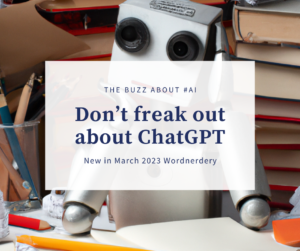 If ChatGPT wasn’t a robot, it might well be blushing. That’s because people are endlessly talking about it.
If ChatGPT wasn’t a robot, it might well be blushing. That’s because people are endlessly talking about it.
Writers especially are wondering if a chatbot can do what we do.
In early tests, not very well. Text generated by artificial intelligence (AI) reads like your – OK, my – boring, rambling school essays. It’s not original and can’t come up with creative answers to new problems. It has limited knowledge of the world and events after 2021. It’s often wrong and has no sense of humour or personality. And as ChatGPT creator OpenAI admits, it “may occasionally produce harmful instructions or biased content.” Well, then!
In some ways, it’s a bit like Wikipedia. What you get probably isn’t impartial or entirely accurate, which is why you can’t rely on it for research. But it is helpful as a place to start, and it certainly is fast.
AI is already putting a robotic toe in the writing market, and the March issue of my newsletter, Wordnerdery, collects perspective on what ChatGPT is and isn’t good for. You’ll also find opinions on the ways real writers will shine. Take that, #AI!
Have a look and let me know if you agree.
Wordnerdery is a quick read about words, effective/expressive writing, newsletters and more. Are you a subscriber yet? If yes, thanks for reading! If not, you can sign up right now. In keeping with Canadian and American anti-spam laws – and just plain good manners – you can easily unsubscribe any time.
